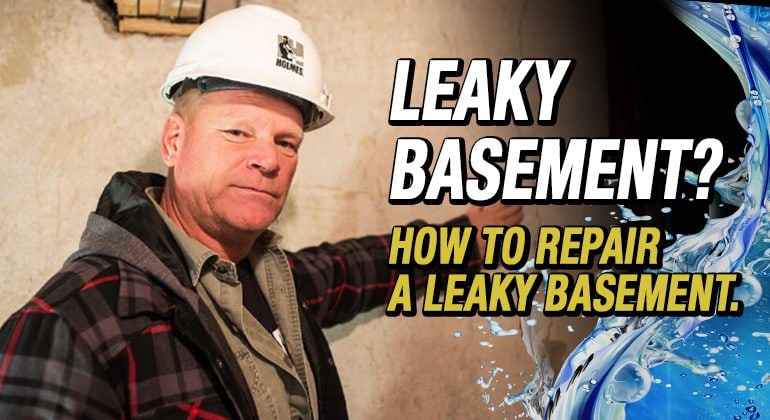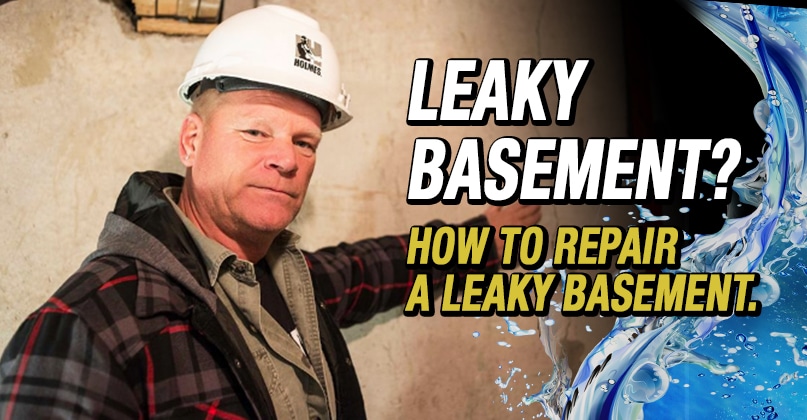I love exploring new technology—especially when it genuinely improves how we work in construction—and I recently came across one that truly impressed me, iGUIDE by Planitar Inc. In my...

How To Repair a Leaky Basement
By Mike Holmes
Mike’s Advice / Home Renovation
Tuesday, June 29th, 2021 @ 9:55am
I get a lot of questions and emails from concerned homeowners worrying about their leaky basement. They’ve found a crack in their foundation, they’re worried about water getting in, and they want to know what they can do to protect their homes from inside and out: their basement and foundation.
Your foundation walls are under a lot of stress. Expanding and contracting soil, excessive moisture and drainage issues are some of the most common threats to your home’s foundation. We want the foundation to keep water on the outside. A leaking foundation needs to be addressed.
Poured concrete has been the most common type of foundation since about the 1920s, along with concrete block (also called cinder block) and pre-cast concrete sections. Concrete is somewhat more impervious to moisture, but all will absorb water.
Signs You Have Foundation Wall Issues
Ever gone for a drive in the country and seen an old barn leaning to one side? Chances are, you are looking at a foundation that has lost its footing. Sometimes the signs aren’t so obvious.
- If your crawl space is wet, you have sagging floors or cracks in your basement walls, you could potentially have a foundation issue.
- Foundation walls that buckle, bulge or lean in any direction
- Uneven roofline. If there are problems with settling or sinking of the foundation, you will see it in the roofline.
- Major wall cracks of a ¼ inch or more, especially if the cracks run in different directions or if they extend up into exterior walls of brick, stone or stucco.
- Any new or enlarge windows that were a DIY install. The structure must be supported properly, or the new opening will introduce a domino effect of problems. Always ask to see permits.
- Wet basement/water in the basement.
- Water Pooling on the basement floor. The same hydrostatic pressure that forces water into the basement also presses upward on the basement floor and can cause it to crack. This will allow water to seep into your basement when the water table rises. Generally, if you see water on your walls or floors in the basement, you need to investigate.
Cracks in the Foundation
Not all cracks are serious – so if you do see a foundation crack, don’t start to panic. When concrete cures or dries, it can crack, so if you’ve just laid a new foundation and see a few small cracks, don’t call me just yet.
The same goes for concrete floors by the way. If you have a crack in your concrete floor, read this.
Here’s a pro-tip-Mark the cracks with tape and check back in a few months. If they aren’t growing, they can usually be filled with an epoxy injection or expandable foam.
It’s for this reason, I wouldn’t recommend finishing a basement right away after a new foundation is placed.

Let your home go through a few winter seasons – so if any cracks do appear, they can be fixed more easily.
Professional Basement Waterproofers
When my son was renovating his home in Holmes and Holmes, he found some major cracks in his foundation, so big repairs became a necessity. If you can fit a coin in any of the cracks, it’s time to waterproof from the outside. A big thank you to RCC Waterproofing for always Making It Right for our projects! Amazing basement waterproofers.
The waterproofing materials include hydraulic cement, two layers of Hydro Guard rubberized membrane, a reinforcement mesh, air-gap drainage membrane, drainage tile (weeping tile) and 3/4 inch gravel.
When it comes to foundation cracks, you don’t want to take chances. Think about the building envelope – start by protecting your house from the outside and work your way in.
How to seal cracks in the foundation in your basement?
In the case of serious cracking, you will want to excavate the foundation to expose the crack from the outside. Cracks will then be filled with hydraulic cement that will expand as it dries, creating a seal.
This is when you will need to bring in professional basement water proofers.
Exterior or Interior Waterproofing?
Exterior waterproofing is really the only way to guarantee the basement will stay dry for the long term.
You will want to wrap your foundation in a waterproof membrane. Usually, a black tar or asphalt compound will be painted on your concrete foundation. This is covered by a waterproof mastic coating, a mesh coating, and finally another layer of mastic coating. This is to keep water vapor from seeping through the concrete foundation.
You can use a Polyurethane injection to fill in the smaller cracks and keep moisture from coming through those cracks.
READ NEXT:
How To Prevent Water Coming Into The Basement
Proper sloping around your property will prevent more water from coming in. When you bring in an expert to repair your foundation, the measure of a true pro will be if they’re checking grading around the home.
Whenever I’m checking out a home, I like to carry a small rubber ball with me. Why? It offers a quick and easy way to test the grading of the driveway.
Simply place the ball on the pavement and see which direction it rolls – you want the driveway to be graded so that the ball rolls away from the foundation. It stands to reason that meltwater will flow in the same direction of the driveway.
READ NEXT:
Protecting Your Basement In Winter
When the ground is frozen during the winter, excavating to repair any major cracking isn’t really an option. So what can you do to protect your basement from water during the winter months? Start by taking care of your pipes.
A frozen pipe can burst leading to water damage directly to your foundation. A frozen pipe can burst leading to water damage, especially if you have preexisting cracks in your foundation.
Sometimes hot and cold water lines are close to outside walls, especially when it comes to kitchen sinks. Proper insulation will go a long way to protecting your pipes.
Check Your Drainage System
Check your eavestroughs to make sure there are no blockages that will prevent meltwater from freely flowing – install screens to keep debris out of your system. Make sure that your downspouts are ejecting water at least 3 feet away from your home.
When it comes to your foundation – you don’t want to take any chances. Don’t let the cracks crack you up, if you’re worried about water, it’s time to call in the experts.
READ NEXT:









